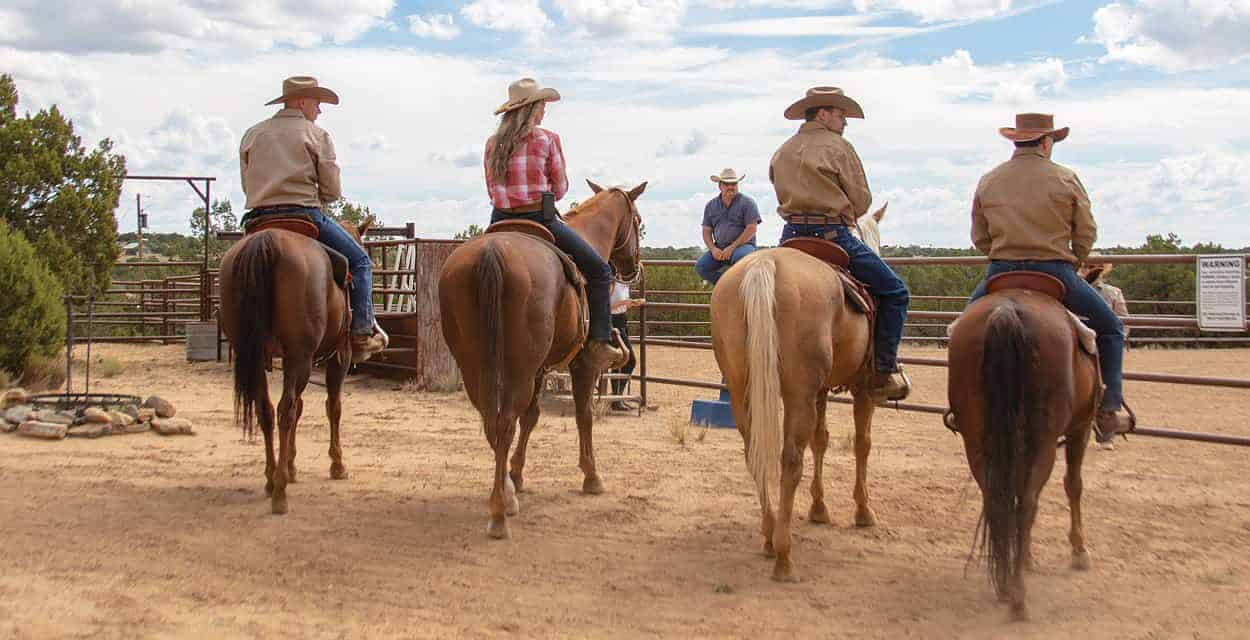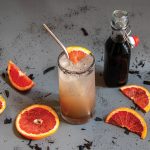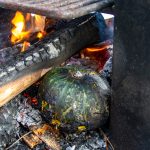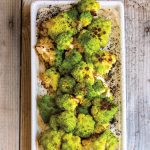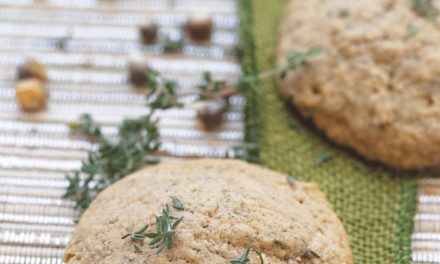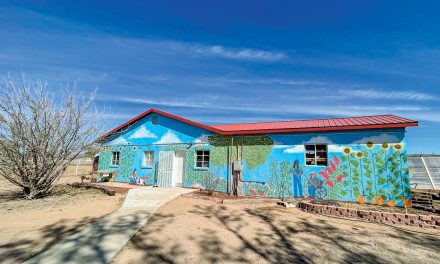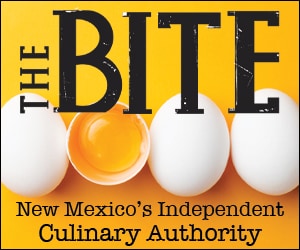Veterans find a place at the table
By Candolin Cook · Photos by Stephanie Cameron

“We believe the creator gave us the horse as a gift of transcendence bridging the spiritual world with physical world,” says Rick Iannucci.
Shortly after dawn on a crisp October morning, I find myself partaking in a yoga class on the porch of a rustic bunkhouse just south of Santa Fe. The group’s sun salutations feel especially tranquil thanks to the soft, warm sunlight flooding over us from the east, the sound of water cascading down the rocks of a nearby fountain, and, oddly, the sweet smell of horse manure—a scent ubiquitous here at the Crossed Arrows Ranch. The half dozen participants surrounding me are not the typical Santa Fe yogis, but combat veterans, gathered here from across the country to participate in the Horses For Heroes Cowboy Up! program. This unique nonprofit utilizes horsemanship, ranch work, and other activities to promote healing and camaraderie, and to teach veterans how to incorporate or “restructure” the skills they learned in the military into their everyday lives.
Our leader this morning is Maj. John Wojtowicz, a retired Iraq War vet who teaches yoga at a VA in Philadelphia. As he instructs the class to bend into downward dog, Wojtowicz encourages us to only stretch as far as we are comfortable, ever-mindful that this particular group may have chronic injuries preventing certain movements. “Everybody has their aches and pains, even if they’re not deemed ‘combat wounded’,” says Horse For Heroes co-founder and executive director Rick Iannucci, “and those pains aren’t always physical, of course.” Iannucci explains that up to eighty-nine percent of veterans sustain some form of combat trauma, either through physical injury or PTSD; yet many don’t qualify for wounded veteran programs. Iannucci, a former Green Beret and US Marshall, and ordained minister, and his wife Nancy De Santis, a certified riding instructor and gestalt coach with a background in veteran wellness and trauma, founded Horses For Heroes in 2008 because they wanted all veteran and active duty women and men to have an opportunity (free of charge) to “recuperate, recreate, and reintegrate into their communities.”
For a decade, Horses For Heroes has helped vets achieve these goals, in part, by fostering connections. Those connections may be between human and horse or between mind and body, as yoga teaches. It could be through a relationship to the land, or with God; Iannucci built a small chapel on-site and welcomes all faiths. Powerful connections are also established between participants, often through team work, such as cattle drives, or by swapping stories on the porch. This particular week is a special one at Crossed Arrows Ranch because it marks the first retreat that Iannucci and De Santis have designed to specifically center on connection through food—and is part of a new, larger initiative focused on “creative cognizance,” called the Resilient Warrior program.

Each afternoon, a different local chef prepares lunch for the group, then gives a hands-on cooking lesson, culminating in a bountiful dinner prepared by the veterans. “We want to give [our vets] practical and creative tools for their tool kit,” says Iannucci. “Learning some culinary skills so that they can go home and cook for their families and friends is a way for them [to demonstrate] belonging and gratitude.” Today’s chefs are Josh Baum, executive chef and owner of Santa Fe’s The Ranch House, and his sous chef/kitchen manager Rob Smilow. “It’s rewarding for us to be able to share what we do and help Horses For Heroes in any way possible,” says Baum. “Rick and Nancy are pretty amazing. They have so much passion for what they are doing, it’s inspiring.”
As Baum and Smilow begin prepping lunch, the vets head to the corral to groom, saddle, and practice groundwork exercises with their assigned horses. “Get your gig line straight,” De Santis instructs Kenny Szesnat, meaning to center himself and sit tall in the saddle. Using such military jargon and concepts to communicate is one way the program restructures the vets’ military knowledge and skills for civilian life. While most of the veterans here this week are returning participants, it is the first visit for Szesnat, a police officer from Florida and former Marine. His friend and fellow Marine Chris Mascari, who is about to begin a masters program in wildland biology in Montana, encouraged him to try the Cowboy Up! program—this is Mascari’s fourth visit. Both men are in their late twenties, husbands and fathers, and veterans of the 3/6 Marines known as the “Marjah Marines.” This regiment was part of the coalition deployed to the Taliban-held city of Marjah, Afghanistan, in 2010, as part of Operation Moshtarak. The offensive was the second-largest battle of the war in Afghanistan; its troops experienced considerable casualties and, tragically, they continue to suffer casualties because of deaths by suicide.
While suicide prevention is essential to many veterans’ therapy programs, Iannucci tells me that diagnosing and treating those at risk is difficult because not everyone’s experience falls under the clinical definition of PTSD. He instead prefers the term “post-traumatic spiritual dissonance.” While Iannucci has a longer, more nuanced explanation, at its core this term means that a vet is experiencing an internal struggle stemming from military experience that leaves the afflicted feeling “disconnected” in some capacity.
Iannucci and De Santis believe working with horses can be one effective way of combating this disconnect. “Breakthroughs don’t happen for everyone in a little white room,” says Iannucci. “It’s not about a horse ride,” says De Santis, “it’s about connecting with another [living creature], learning how to harness your energy, and being present in the moment.” Program volunteer and Army veteran Brian Ray theorizes why that skill may be helpful to some veterans: “In my experience, if you’re anxious you’re worrying about the future. If you’re angry you’re thinking about the past. But if you’re calm you’re in the present.”

Once horse work is done for the day, we head back to the bunkhouse to wash up and eat the cowboy-friendly smoked brisket and rib lunch that Baum and Smilow have prepared. Table talk begins by complimenting the fluffy, sweet cornbread and perfectly seasoned Yukon gold potato salad, and ends in a debate among the veterans over the best and worst MREs (meals ready to eat)—the mac and cheese is OK, the omelettes are disgusting.
After we devour our meal, Baum and Smilow take the vets to the kitchen and walk them through the process of preparing tonight’s English-style braised short ribs, teach them how to safely chop onions and squash for calabacitas (fold those fingers under at the knuckle), and how to make a simple, delicious apple crisp that their kids will go crazy for. “All of these dishes are super approachable,” says Baum. “I want you guys to be able to recreate them at home and not feel intimidated in the kitchen.” The group is full of enthusiasm and questions—why do we add salt to pasta water? and sear the ribs before braising?—as well as gratitude for the chefs. “Everyone likes to say they support the troops,” says Iannucci, “but saying ‘thank you for your service’ is empty without action. The chefs we have assembled here for this training are action guys, the real-deals.”
A few hours later, with the enticing smell of braised beef and baked apples in the air, we gather around the table to eat this special dinner. Iannucci removes his cowboy hat and we all join hands as he gives the blessing—something that occurs before every meal at the ranch. The minister later tells me that “food and faith are woven together in every culture and faith tradition. Interestingly, the word faith is used less than three hundred times in the entire Bible, while the verb ‘to eat’ is used more than eight hundred times.” He says that “food, faith, fun, and family” are inextricably linked at his table, and there is a seat for everyone.

From left to right: Rick Iannucci, Brian Ray, John Wojtowicz, Kenny Szesnat, Josh Baum, Rob Smilow, Chris Mascari, and Nancy De Santis.
Edible celebrates New Mexico's food culture, season by season. We believe that knowing where our food comes from is a powerful thing. With our high-quality, aesthetically pleasing and informative publication, we inspire readers to support and celebrate the growers, producers, chefs, beverage and food artisans, and other food professionals in our community.

